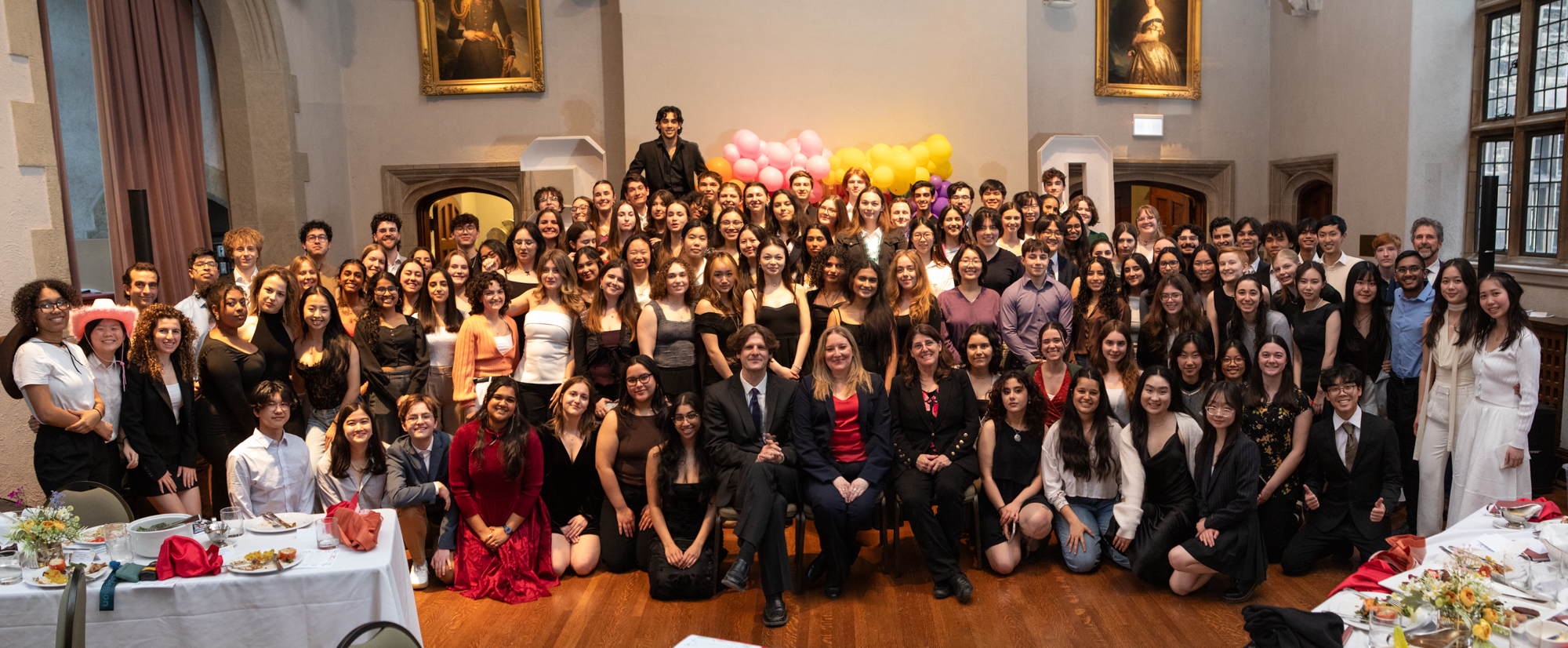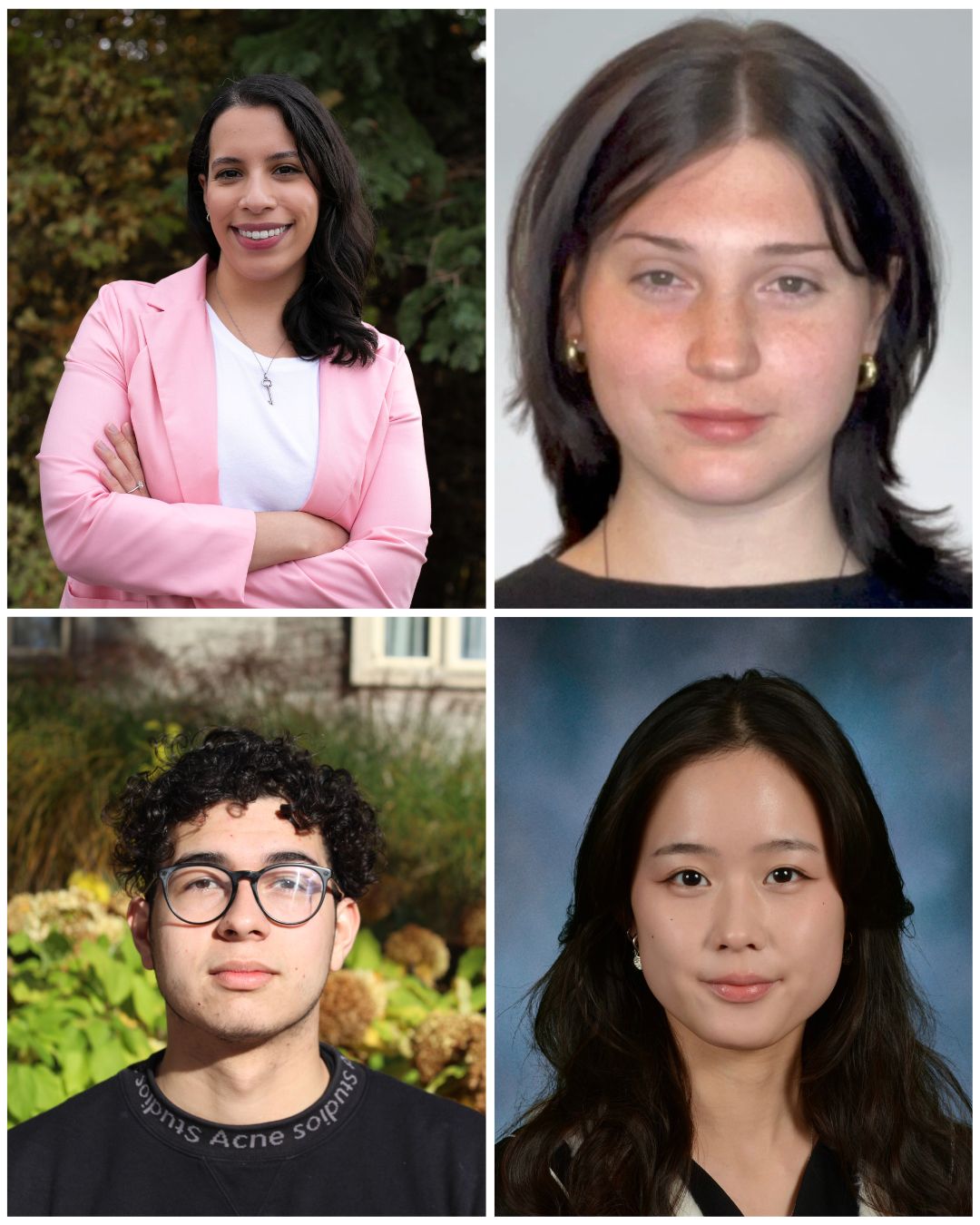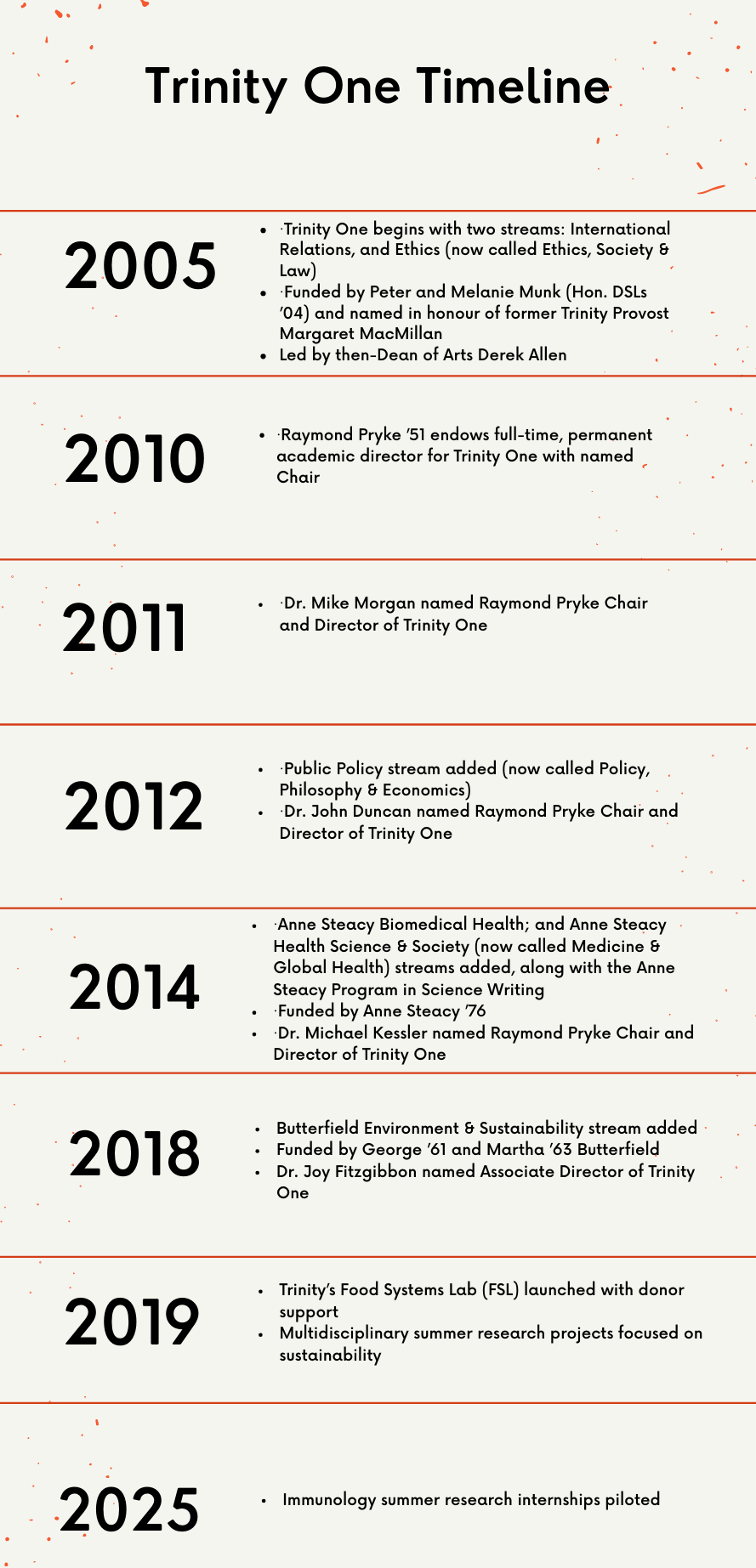
The Margaret MacMillan Trinity One Program marks its 20th year in 2025. And there is much to celebrate: The flagship first-year foundational program has built a global reputation and a legacy of successful, compassionate graduates who are making positive change in the world.
For Hélène Emorine ’18, her current post as climate negotiator for the Government of Canada was something she could “only have dreamt of” when she arrived at Trinity over a decade ago. As a first-year student in the International Relations stream of the Margaret MacMillan Trinity One Program, she says she developed the skills to make that dream a reality.
“Trinity One helped me go into spaces like Oxford for my post-grad, a large professional firm like Deloitte to start my career, and onto the world stage to represent Canada as a climate diplomat, without having imposter syndrome,” Emorine says. “The program provided me with the confidence to be able to speak and to share my analysis and opinion, and know my voice is valued.”
Are you a Trinity One alum? Please get in touch to be notified of our 20th anniversary celebration plans!
Laying the foundation for success
As part of the University of Toronto’s First-Year Foundations Ones programs, the Margaret MacMillan Trinity One program provides first-year students with the opportunity to explore major issues and ideas in a small-group environment. For many students, the program equips them to take advantage of the considerable opportunities within the larger university environment of U of T, which can be overwhelming for an undergrad arriving on campus.
Any student who has applied to the Faculty of Arts & Science on the St. George campus may apply to Trinity One, although roughly three-quarters of Trinity One students are also affiliated with Trinity College, says Program Director Michael Kessler ’02. The program has grown from two academic streams in 2005 to six today: International Relations; Ethics, Society & Law; Policy, Philosophy & Economics; Anne Steacy Biomedical Health; Anne Steacy Medicine & Global Health; and Butterfield Environment & Sustainability (see timeline below).
“The goal of Trinity One is to create layers of support,” Kessler says. “Obviously we have an academic focus, but equally important are the student-professor and student-student relationships that are built over the year. Those relationships continue through their university years and beyond.”
“It was a life-changing experience for me,” Aimie Zheng ’25 (Neuroscience and Environment & Health, minor in Biology) says of her time in Trinity One. “I learned how to step out of my comfort zone. And I learned skills, like conducting literature reviews, that helped me tremendously in my upper-year courses when I had to do research and thesis work.”
Luis Sanchez-Blanco ’25 says that choosing Trinity One was “one of the best decisions I ever made. It teaches you to think better. The coursework is extremely rigorous — my later years seemed easier than what I did first year,” he says.
Real-world skills
For Garyn Rickwood ’25, who graduates this year with a double major in Ethics, Society & Law, and Criminology, the program helped her overcome her natural shyness. Beyond that, she adds, “Our professors would push us with these hypothetical situations where we really had to think on our feet and respond. I don’t think I’d be applying to law schools today without having had that experience to bring me out of my shell.”
Joy Fitzgibbon, Associate Director and a long-time professor with the program, says that focus on skills development is a key advantage of the Trinity One program. “Many students graduating today aren’t equipped with everything they need to be employable,” she says. “Trinity One addresses this by focusing on professional skills that aren’t typically taught in university. What does it mean to be a good colleague? How do you conduct tough conversations respectfully or work with people who have different perspectives? We help our students develop leadership skills – and perhaps more important — learn to advance projects collaboratively. We’re trying to remove some of the competitiveness inherent in university culture and replace it with a community approach. We move forward, together.”
In Rickwood’s case, the skills she developed in Trinity One led her to seek out leadership opportunities including becoming President of the Ethics, Society & Law Students’ Association, and Co-Valedictorian of the 2025 E,S &L graduating class.
Learning outside the classroom
The program’s curriculum is enriched by guest speakers, field trips, undergraduate research conferences, skills-building workshops and community building events throughout the year. Many of those experiences are university highlights for Trinity One alumni. “One of my best Trinity experiences was when I was a Trinity One peer mentor last year and we organized a conversation with Larisa Galadza ’94, Canada’s former ambassador to Ukraine,” Rickwood says. “I found her so impressive, and it was amazing to be able to co-lead the session with her.”
Trinity One has benefited throughout its 20 years from the generosity of donors who understand the need for this type of learning. Key supporters have included Peter and Melanie Munk (Hon. DSLs ’04), Raymond Pryke ’51, Anne Steacy ’76, and George ’61 and Martha ’63 Butterfield, all of whom have played a major role in shaping the program today.
An important addition to Trinity One over the past few years is summer internships directly following first year. So far these have been limited to sustainability-focused opportunities, based on specific donor support, says Kessler, with lab-based immunology placements being piloted this summer. “Our ultimate goal is to be able to offer internships to students in all Trinity One streams,” he says.
Peer mentorship
Trinity One grads have the opportunity to maintain their connections to the program by acting as peer mentors for first-year and prospective Trinity One students. Both Zheng and Rickwood were second- and third-year peer mentors. “I wanted to give back to a community that has given so much to me,” Rickwood says.
Mentorship begins even before first-year students arrive on campus. During “Shadow Days,” high school students are matched with a Trinity One student who acts as their peer ambassador for a day during March Break, including attending a Trinity One class. “I’ve seen so much growth over the past four years in the kinds of workshops and events we offer for first-year students,” Zheng says. “We really tailor them to their specific interests.”
The mentors themselves benefit greatly from their involvement. “We’re very intentional about mentoring our mentors and giving them a lot of opportunities to grow their leadership skills,” Fitzgibbon says.
Lifelong connections
For Emorine, the community she found in Trinity One has had a lasting impact on her life. “I met my best friend in the program,” she says. “And on a broader scale, I learned the value of creating networks and spaces for dialogue, and have tried to continue that throughout my career. That’s also the reason I founded the International Relations Alumni Association a few years ago.”
Many students forge lasting bonds with professors in the program as well. Sanchez-Blanco mentions Professor Joy Fitzgibbon and Professor Arne Kislenko as being “my mentors to this day.” He graduates this spring with a double major in Political Science and History, and was recently named a 2025 University of Toronto Alumni Association (UTAA) Scholar.
For Rickwood, Professor Simone Davis and Professor Amanda Turnbull continue to be touchstones: “They truly care about their students, and are genuinely interested in discussing our careers and interests outside the classroom.”
Growth on the horizon
While the focus of Trinity One will always be small group environments, there is a significant need to grow summer internships and research opportunities for students, says Kessler. And additional streams may be on the horizon “if they meet our overall strategic goals for the program.
“Our students want to make the world a better place,” Kessler continues. “Many Trinity One grads go on to careers in helping professions. Every year we turn away great students. We want to be able to offer more seats, and an even richer Trinity One experience and opportunities for students in the future.”
Year-long celebrations
The Trinity One 20th anniversary celebrations officially kicked off with an end-of-term dinner at the College on April 3. As is tradition, all Trinity One first-year students who have completed the program, along with faculty and staff, were there. This year’s dinner also included Trinity One alumni who are graduating in June: “These were the students who weren’t able to have their end-of-term dinner after first year because of COVID,” says Kessler. “We wanted them to have that opportunity – it made it an extra-special celebration for all of us.”
But the biggest party is yet to come. All Trinity One alumni, faculty and staff from the past 20 years will be invited to reconnect and celebrate on campus this fall. “This year’s incoming class will also have the distinction of being our 20th cohort – what a warm welcome they’re going to receive!” Kessler says.
A proud legacy
“What I am most proud of in the Trinity One Program is our students,” Fitzgibbon says. “They are intellectually gifted, of course, but they also bring an enthusiasm for learning and a strong commitment to serve others. They ask hard questions, challenge themselves and each other, and do so with integrity. They are compassionate, empathetic people who, as they grow in community, build strong social and intellectual bonds to empower their lives of service.”
Are you a Trinity One alum? Please get in touch to be notified of our 20th anniversary celebration plans!
by Jennifer Matthews
“It was important that this gift help to educate young people on the complex issues of environmental stewardship. We want them to be equipped with the tools they need to see the challenges we are facing from a variety of perspectives … We believe the Trinity One Program is the perfect fit for a multi-faceted approach to preparing tomorrow’s environmental leaders.”
–Martha Butterfield, Butterfield Environment & Sustainability Stream
“I approached the College in February 2013 with an indistinct idea of how to accomplish something special and unusual with my legacy … Our goal was not just to fill a gap, but to found a stellar initiative.”
“I believe that the avid students at Trinity are poised to take custody of the exploration of new and exciting frontiers from the world of science. Through these additions to the Trinity curriculum, I am truly delighted to assist in that exploration and in the development of these scientists’ ability to communicate their visionary sightings to the world.”
– Anne Steacy, 2014
“Trinity One allowed me to approach academic interest from a global health perspective and think about how we can translate scientific findings into accessible medical therapy available to everyone.”
–Abdula Maher ’19, PhD candidate, U of T Institute of Medical Science
“I loved my own experience as an undergrad at Trinity. But when I look at the ways we are scaffolding the student experience through the Trinity One program, the difference is night and day … we’re seeing lives transformed.”
– Associate Director Joy Fitzgibbon
“We know that a high number of Trinity One students accept their U of T offers only after being offered a seat in Trinity One. We definitely have an opportunity for continued, strategic growth.”
— Director Michael Kessler


